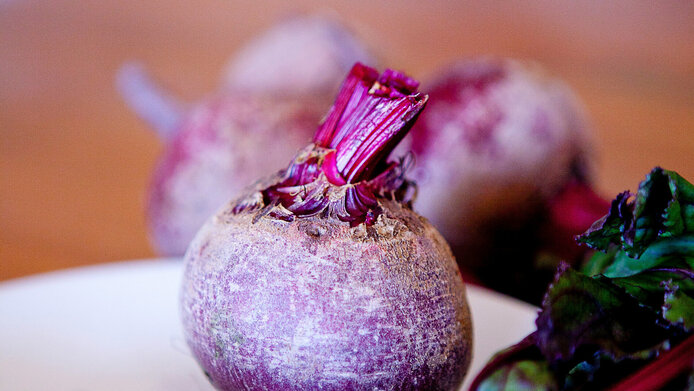Bewildering beetroot

Hardly a day goes by without nutritional recommendations being featured in the media. But even in the case of supposedly “healthy” or “unhealthy” foods, the state of research often lacks the clarity that one tends to assume it has. This is also true of beetroot. Similar to spinach, rocket and lettuce, it contains large amounts of nitrate. In the past, this nitrogen compound used to be considered a cause for concern, since the nitrate is converted to nitrite in the body, and nitrite can potentially be transformed into carcinogenic compounds. Today, however, there is increasing evidence that nitrate from plant sources has a positive effect on the cardiovascular system.
This makes it all the more important to test the effects of beetroot and of nitrate in carefully controlled studies. For this purpose, the Austrian Science Fund FWF is funding the clinical project “Dietary nitrate, vascular function and inflammation” led by nutritionist Oliver Neubauer from the University of Vienna in cooperation with the Medical University of Vienna. Participants were individuals taking medication for elevated blood pressure, recruited according to strict criteria, and the study team investigated the short and long-term effects of beetroot. While an initial publication from the project shows no positive effect on blood pressure in this particular cohort, the findings still permit some interesting conclusions.
No long-term reduction in blood pressure
For the study, some of the 15 participants drank a daily dose of 140 ml of a beetroot concentrate which contained 800 mg of nitrate, which is a particularly high dose. The other group received a low-nitrate beetroot juice as a placebo. After four weeks of ingestion and four weeks of washout period, the groups were switched. In between, the team conducted measurements to monitor vascular function and blood pressure and collected samples of blood, saliva and stool. The first results are now available.
The researchers found that beetroot juice significantly reduced blood pressure three hours after drinking, which is also corroborated by current research opinion. What the researchers did not find, however, was a sustained improvement in blood pressure levels with long-term consumption over four weeks. “These results are another piece of the jigsaw in nitrate research. They show that under these conditions and with the high dose administered, strong long-term effects can probably not be expected,” says Neubauer, commenting on the findings.
Strict controls and inclusion criteria
“It is important to mention that we used a very robust methodology for the measurements, particularly for vascular function and blood pressure,” says principal investigator Neubauer. In addition to the extensive examinations at the hospital, participants had to measure their own blood pressure at home at specific points in time. Before each examination, blood pressure was measured for 24 hours using an automatic blood pressure monitor.
In addition, the researchers had pre-selected the study participants in line with clear definitions. Given that the study aimed at examining individuals with an increased risk of cardiovascular disease, the researchers restricted their selection to people over the age of 50 with high blood pressure. People who already had recognizable cardiovascular diseases were excluded. In addition, a whole range of other criteria were applied that are specifically relevant to beetroot and nitrate research.
Restricted mouthwash, no sports
Nutrition sets in motion many processes in the organism. For this reason, studies on food have to exclude a large variety of side effects. To give an pertinent example: while the body absorbs nitrate from beetroot, it is bacteria in the mouth that convert it into nitrite, which is then further converted into nitric oxide in the body. Only in this form does it have a lowering effect on blood pressure. Anyone who uses mouthwash excessively kills these bacteria. “There are well-controlled studies that show that this circumstance alone increases blood pressure,” says Neubauer, which explains why people with this habit were not eligible for the study. The participants also had to reduce their intake of other nitrate-rich foods and were not allowed to eat a vegetarian or vegan diet. Those who engaged in too much exercise were also excluded because this leads to the body producing its own nitric oxide.
In pursuit of explanations
Neubauer is pursuing various possible explanations as to why there was no long-term effect on blood pressure in the strictly controlled group. “One assumption is that the formation of the body’s own nitric oxide decreased due to the high dose and the long period of time, and that the effects canceled each other out,” notes Neubauer. The research group now needs to evaluate the data obtained for other factors that can lead to cardiovascular disease. For example, there are initial indications that although long-term intake has no effect on blood pressure, it does reduce chronic inflammation. Perhaps this is the solution to the beet mystery.
Personal details
Oliver Neubauer, who holds a venia docendi in “Sports nutrition with a physiological focus”, conducted research in Australia as an Erwin Schrödinger Fellow of the Austrian Science Fund FWF. At the University of Vienna, his activities include the “Research Platform Active Ageing”. The clinical study “Dietary nitrate, vascular function and inflammation”, which has been awarded EUR 371,170 in funding from the Austrian Science Fund, is set to run until the end of 2024.
Publication
Fejes R., Lutnik M., Weisshaar S. et al: Increased nitrate intake from beetroot juice over 4 weeks affects nitrate metabolism, but not vascular function or blood pressure in older adults with hypertension, in: Food & Function 2024





